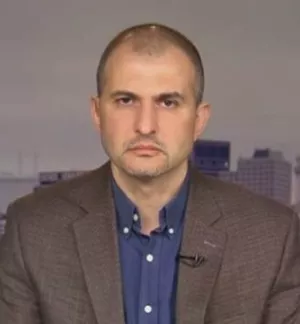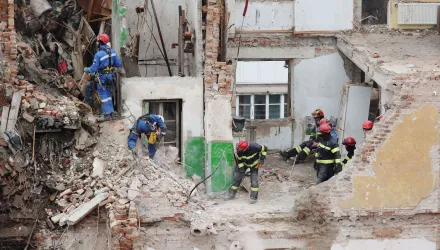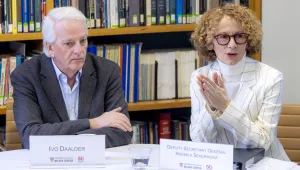More than three years into the war, Ukrainians’ support for continuing the fight against Russia until victory is “collapsing,” according to Gallup’s interpretation of its latest poll on the subject. Indeed, the share of those who think Ukraine should continue fighting until it wins plummeted from 73% in 2022 to 24% in 2025, which represents a decline of more than 67%, according to this international pollster. In the meantime, the share of Ukrainians who think Ukraine should seek to negotiate an end to the war as soon as possible went from 22% to 69%, exceeding that of Russians (63%) who would like to see a negotiated end to the fighting.1
One should not blame the change entirely on the fatigue of war, though it is present and probably increasing. Ukrainian President Volodymyr Zelenskyy’s own behavior, including his transition from a self-imposed ban on negotiations with Russia to repeatedly stating preparedness for such negotiations, has played no small role in shaping the change in the Ukrainian public's attitudes toward peace talks. That Ukrainians follow their leader in his opinions, even if they change, can be inferred from the fact that, despite incremental losses of ground by Ukrainian forces to Russian forces, Zelenskyy’s approval rating was 67% in July, according to Gallup.
However, while support for peace with Russia did increase among Ukrainians, according to Gallup, one should bear in mind that the devil has been in the details: it is one thing to support peace talks in general and it is quite another to support compromises that such peace would require. According to a poll conducted by the Kyiv International Institute of Sociology (KIIS) from July 23 to Aug. 4, only 17% of those Ukrainians surveyed would accept a peace plan on Russian terms, with 76% of respondents “categorically against” such compromises.2
In contrast, of the KIIS poll’s respondents, 39% would accept the “conditional plan of the U.S.,” while 49% would not.3 The most popular plan—with 54% of Ukrainians in support and 35% opposed—was the “conditional plan of Europe and Ukraine.”4 Thus, while the majority of Russians also favor peace talks, when asking them (as Levada did) on what conditions that peace could be attained, you’d see little room for reconciling the Russians’ and Ukrainians’ positions.
That said, there has been some narrowing of the gap between the Russians’ and Ukrainians’ views on certain issues that need to be resolved for the sides to make peace, such as Ukraine’s membership in Western clubs. The share of Ukrainian respondents to Gallup’s polls that believe Ukraine will be accepted into NATO within 10 years decreased from 64% in 2022 to 32% in 2025. As for the share of Ukrainian respondents who believe Ukraine will be accepted into the EU, that share declined from 73% to 52% in the same period.
As interesting, while the share of Ukrainians who think Ukraine should seek to negotiate an end to the war as soon as possible has soared from 22% in 2022 to 69% in 2025, as stated above, only 25% of the Gallup July poll’s respondents believe it is somewhat or very likely that active fighting will come to a lasting end within the next 12 months, while 68% think it is unlikely. Still, in spite of such bleak prospects, the majority of Ukrainians believe the U.S., U.K. and EU should continue playing significant roles in the peace talks.
In summary, while Ukrainians increasingly favor negotiations to end the war, large majorities remain unwilling to accept peace on Russia’s terms. Moreover, Ukrainians’ confidence in a near-term peace is low, and expectations of joining NATO are declining. Nonetheless, the Ukrainian public continues to look to Western partners for significant involvement in any peace process, highlighting both changing sentiments and enduring red lines in the search for an end to the conflict.
Footnotes
- A July 2025 Levada Center poll found 78% of Russians support their military’s actions in Ukraine (46% “definitely support,” 32% “rather support”), while 16% oppose. Interest in peace talks remains stable: 63% favored peace negotiations with Ukraine in July, compared to 64% in June.
- “Russia’s conditional plan,” as defined by KIIS, would have: Ukraine significantly reduce its army and limit its armaments; permanently renounce NATO membership; give up the cities of Kherson, Zaporizhzhia, and all of Donetsk, Zaporizhzhia and Kherson oblasts to Russia; and officially recognize all the occupied territories as part of Russia, while the U.S. and Europe would lift all sanctions against Russia, and Ukraine would be allowed to join the EU.
- Under the U.S. peace plan, a group of only European states would give Ukraine security guarantees, Russia would retain control over the occupied territories, the U.S. would officially recognize Crimea as part of Russia, the U.S. and Europe would lift all sanctions against Russia, and Ukraine would move toward joining the EU.
- Under this peace proposal, Ukraine would receive reliable security guarantees from both Europe and the U.S.; Russia would retain control over the occupied territories, but Ukraine and the world would not officially recognize it; Ukraine would move to join the EU, and the U.S. would gradually ease sanctions against Russia, but only after a sustainable peace is established.
Saradzhyan, Simon and Angelina Flood. “Polls Show Ukrainians Increasingly Want End to War, But Not Under Russia’s Terms.” Russia Matters, August 8, 2025
The full text of this publication is available via Russia Matters.







